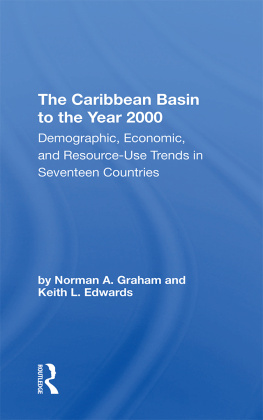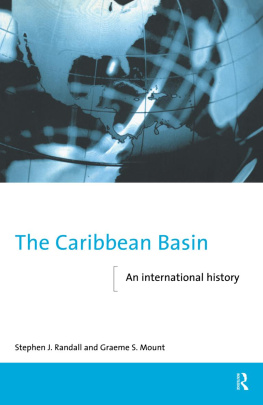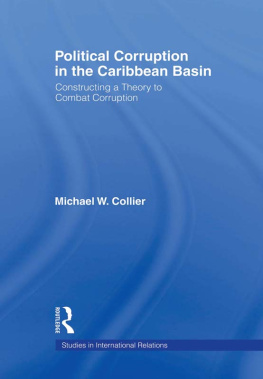The Caribbean Basin to the Year 2000
Westview Replica Editions
The concept of Westview Replica Editions is a response to the continuing crisis in academic and informational publishing. Library budgets for books have been severely curtailed. Ever larger portions of general library budgets are being diverted from the purchase of books and used for data banks, computers, micromedia, and other methods of information retrieval. Interlibrary loan structures further reduce the edition sizes required to satisfy the needs of the scholarly community. Economic pressures on the university presses and the few private scholarly publishing companies have severely limited the capacity of the industry to properly serve the academic and research communities. As a result, many manuscripts dealing with important subjects, often representing the highest level of scholarship, are no longer economically viable publishing projects--or, if accepted for publication, are typically subject to lead times ranging from one to three years.
Westview Replica Editions are our practical solution to the problem. We accept a manuscript in camera-ready form, typed according to our specifications, and move it immediately into the production process. As always, the selection criteria include the importance of the subject, the work's contribution to scholarship, and its insight, originality of thought, and excellence of exposition. The responsibility for editing and proofreading lies with the author or sponsoring institution. We prepare chapter headings and display pages, file for copyright, and obtain Library of Congress Cataloging in Publication Data. A detailed manual contains simple instructions for preparing the final typescript, and our editorial staff is always available to answer questions.
The end result is a book printed on acid-free paper and bound in sturdy library-quality soft covers. We manufacture these books ourselves using equipment that does not require a lengthy make-ready process and that allows us to publish first editions of 300 to 600 copies and to reprint even smaller quantities as needed. Thus, we can produce Replica Editions quickly and can keep even very specialized books in print as long as there is a demand for them.
About the Book and Authors
The Caribbean Basin to the Year 2000: Demographic, Economic, and Resource-Use Trends in Seventeen Countries A COMPENDIUM OF STATISTICS AND PROJECTIONS
Norman A. Graham and Keith L. Edwards
Bringing together a wealth of data not easily obtainable elsewhere, this book comparatively analyzes long-term demographic, economic, and resource-use trends in seventeen Caribbean basin countries. More than one hundred tables and figures provide information on a wide range of topics, including fertility rates, income distribution, energy consumption, arable land per capita, receipts from tourism, foreign trade, oil and mineral resources, and U.S. military assistance. The authors point to the potentially destabilizing role of rapid population grewth, limited natural resources, weak national economic performance, and income disparities, incorporating a variety of forecasting techniques to examine the impact of these factors for each country to the year 2000. The study concludes with an assessment of the implications of the findings for U.S. security and economic interests.
Norman A. Graham, manager of international studies at The Futures Group, is co-author of The U.S. Export-Import Bank: Policy Dilemmas and Choices (Westview, 1984) and The United States and Multilateral Diplomacy. Prior to joining The Futures Group, he served as a research associate with the United Nations Institute for Training and Research. Keith Edwards is an economist at The Futures Group with responsibility in the areas of innovation studies, technology assessment, and economic forecasting.
The Caribbean Basin to the Year 2000
Demographic, Economic, and Resource-Use Trends in Seventeen Countries A Compendium of Statistics and Projections
by Norman A. Graham
and Keith L. Edwards
in association with:
James J. Emery
Michael F. Oppenheimer
John G. Stover
Joseph H. Wex
First published 1984 by Westview Press
Published 2019 by Routledge
52 Vanderbilt Avenue, New York, NY 10017
2 Park Square, Milton Park, Abingdon, Oxon OX14 4RN
Routledge is an imprint of the Taylor & Francis Group, an informa business
Copyright 1984 by The Futures Group
All rights reserved. No part of this book may be reprinted or reproduced or utilised in any form or by any electronic, mechanical, or other means, now known or hereafter invented, including photocopying and recording, or in any information storage or retrieval system, without permission in writing from the publishers.
Notice:
Product or corporate names may be trademarks or registered trademarks, and are used only for identification and explanation without intent to infringe.
Library of Congress Cataloging in Publication Data
Graham, Norman A.
The Caribbean Basin to the Year 2000.
(A Westview replica edition)
1. Caribbean Area--Economic conditions--1945 . 2. Economic forecasting --Caribbean Area. 3. Caribbean Area--Population. 4. Population forecastingCaribbean Area. 5. Natural resources--Caribbean Area. 6. Natural resourcesCaribbean Area--Forecasting. I. Edwards, Keith L. II. Title.
HC151.G72 1984 330.9182'1 84-2242
ISBN 13: 978-0-367-29051-1 (hbk)
The authors would like to acknowledge the individual contributions made by several members of the staff of The Futures Group. In particular, we would like to note the general advisory role played by Michael F. Oppenheimer, Vice President for International Programs, and substantive contributions of James Emery and Joseph Wex as panelists for the trend impact analyses of mineral resources for several countries. James Emery also provided the treatment of trends in tourism contained in , and Joseph Wex contributed much of the section on political instability in the same chapter. John Stover, Manager of Analytic Services, provided helpful advice on data sources and many technical suggestions for the use of GLOBESCAN in forecasting social and economic trends in the region.
We also would like to acknowledge the valuable assistance provided by our consultants to the study. Frank P. Le Veness of St. John's University, David J. Louscher of the University of Akron, and Abraham Lowenthal, Secretary of the Latin American Program of the Smithsonian Institution, reviewed an initial draft of the study and made many useful suggestions.
Finally, the authors would like to acknowledge the superb editorial assistance provided by Cathy Johnson and Beverly Pitts, and the efforts of Marion Healy, Gail Layden and June Osborne in preparing the final manuscript for publication.
The research for this study was originally supported by the Department of State under contract No. 17722-220002. The Department, however, bears no responsibility for the findings, analyses and conclusions contained in this volume.
Norman A. Graham
Keith L. Edwards
1
Introduction and Overview
Considerable analysis and policy prescription have been directed toward developments and emerging problems in the Caribbean basin countries of late. Certainly, there is no shortage of views on the ways in which these developments and problems pose policy and security challenges for U.S. policymakers; and President Reagan's Caribbean Basin Initiative (CBI) and Central American policy have generated considerable analysis and debate. Most of this writing and research, however, has generally taken a near-term view, focusing on proximate threats and policy guidance and ignoring or insufficiently treating the major long-term demographic, economic and resource use trends in the region. This study is an initial attempt to explore these trends and their implications for U.S. interests and security in the long term.





